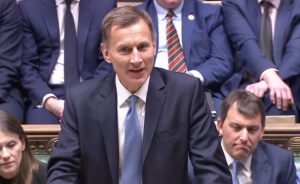
More than a third of Brits surveyed say the budget last week made them more concerned about the state of the UK’s economy.
Chancellor Jeremy Hunt unveiled his spring statement in the House of Commons last week in light of rosier economic projections and within the government’s self-imposed fiscal rules.
He focused on childcare reforms, pensions and business investment but the OBR warned the nation’s tax burden will peak at a post-war high of 37.7 per cent of GDP in 2027-28.
People are also more concerned than reassured about their finances, Ipsos polling found.
Gideon Skinner, from Ipsos, said Brits realised “external factors are also to blame” but added that many still blame the Conservatives “for at least some of Britain’s economic difficulties”.
Meanwhile a separate poll for Opinium finds more than twice as many voters would prefer a Labour government led by Keir Starmer to be running public services and the economy.
Just 17 per cent of people support Rishi Sunak’s Conservative government on its public services record, compared to 43 per cent for the opposition, the Observer reported.
It comes after the government made an enhanced pay offer to unions last week in a bid to put an end to months of walkouts sparked by discontent over wages and conditions.
Just 13 per cent of people said they felt more reassured about their personal finances after Wednesday, with 12 per cent saying the same on public services, the PA news agency said.
The poll of 1,000 British adults also found 22 per cent said the budget left them more reassured about the state of Britain’s economy.
However, 35 per cent said it had made them more concerned about the economy and public services while 37 per cent said they were more concerned about their own finances.
“Changing this will not just depend on immediate responses but whether the public sees any improvement in the economy and public services over the next few months,” Skinner added.
On individual policies, the energy price guarantee extension was backed by 74 per cent of people, while 70 per cent supported the fuel duty freeze and 59 per cent backed the expanded childcare package.
Freezing income tax thresholds and awarding an annual £1m prize for AI innovation were the only policies with more opponents than supporters.
Some 60 per cent of voters blame decisions by Hunt and Rishi Sunak for the current state of the economy, while two-thirds said economic policies over the last 13 years are responsible.
However, Sunak does still lead Starmer on who is more trusted to manage the economy.
Read more:
Brits now more concerned about state of UK economy than before budget, polling finds

